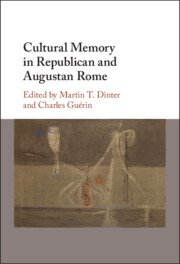Book contents
- Cultural Memory in Republican and Augustan Rome
- Cultural Memory in Republican and Augustan Rome
- Copyright page
- Contents
- Figures
- Contributors
- Acknowledgements
- Chapter 1 Introduction: What is Cultural Memory?
- Part I Writing Cultural Memory
- Chapter 2 War and Cultural Memory at the Beginnings of Latin Literature
- Chapter 3 Creating Roman Memories of Plautus
- Chapter 4 Comedy and Its Pasts
- Chapter 5 Semper Manebit: Poetry and Cultural Memory Theory in Cicero’s De Legibus
- Chapter 6 Varro and the Re-foundation of Roman Cultural Memory Through Genealogy and Humanitas
- Chapter 7 Cultural Memory, from Monument to Poem: The Case of the Temple of Apollo Palatinus in the Augustan Poets
- Chapter 8 Monumenta and the Fallibility of Memory in the Odes
- Chapter 9 Constructing Cultural Memory in Ovid’s Fasti: The Case of Servius Tullius and Fortuna
- Part II Politicising Cultural Memory
- Part III Building Cultural Memory
- Part IV Locating Cultural Memory
- Bibliography
- Index Locorum
- Index
Chapter 3 - Creating Roman Memories of Plautus
from Part I - Writing Cultural Memory
Published online by Cambridge University Press: 27 April 2023
- Cultural Memory in Republican and Augustan Rome
- Cultural Memory in Republican and Augustan Rome
- Copyright page
- Contents
- Figures
- Contributors
- Acknowledgements
- Chapter 1 Introduction: What is Cultural Memory?
- Part I Writing Cultural Memory
- Chapter 2 War and Cultural Memory at the Beginnings of Latin Literature
- Chapter 3 Creating Roman Memories of Plautus
- Chapter 4 Comedy and Its Pasts
- Chapter 5 Semper Manebit: Poetry and Cultural Memory Theory in Cicero’s De Legibus
- Chapter 6 Varro and the Re-foundation of Roman Cultural Memory Through Genealogy and Humanitas
- Chapter 7 Cultural Memory, from Monument to Poem: The Case of the Temple of Apollo Palatinus in the Augustan Poets
- Chapter 8 Monumenta and the Fallibility of Memory in the Odes
- Chapter 9 Constructing Cultural Memory in Ovid’s Fasti: The Case of Servius Tullius and Fortuna
- Part II Politicising Cultural Memory
- Part III Building Cultural Memory
- Part IV Locating Cultural Memory
- Bibliography
- Index Locorum
- Index
Summary
While researching the significance of the various ways in which Latin speakers interpreted the phenomenon of grammatical gender, I spent a substantial amount of time examining ancient Roman scholars, in particular the Latin grammarians.1 Even a cursory reading of the accounts that these scholars have compiled about the masculine, feminine, and neuter soon reveals how they credit different poets with varying degrees of authority in the use and treatment of grammatical gender, even when that treatment may seem inconsequential to modern eyes. As one might expect, the grammarians regularly consider Vergil’s linguistic finesse indisputable, whereas they deem other poets, Lucan for example, to possess ‘lesser authority’ (minor … auctoritas).2 Evaluative remarks such as these prompted me to wonder what characteristics were thought to constitute the ‘poetic authority’ that informed scholars from antiquity in the evaluation and ranking of poets and whether these criteria affected the ways in which poetry was read and evaluated by ancient readers other than grammarians and other scholars.
Keywords
- Type
- Chapter
- Information
- Cultural Memory in Republican and Augustan Rome , pp. 42 - 60Publisher: Cambridge University PressPrint publication year: 2023

